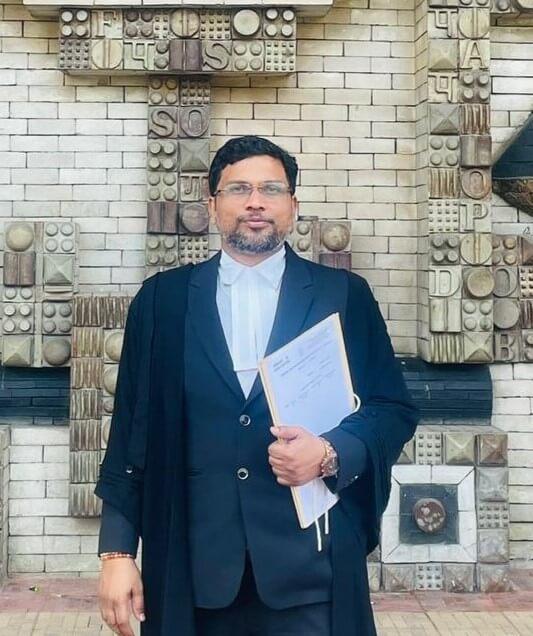How a Lawyer Can Help in Cyber Crime Cases? Have you ever encountered a cyber crime case, accidentally or intentionally? Over 7000 cybercrime cases field in India and this number is growing day by day. In the era of the internet, cybercrime is a cup of tea for everyone. When someone gets into this position how does the individual get out of this? An expert Cyber Crime lawyer can provide proper guidance, collect evidence, and also get in defence. In this blog post, We will discuss how a lawyer can help in Cyber Crime Cases. Understand Cybercrime Cybercrime is a criminal activity with a computer, network, or digital device. This type of crime is done against individuals, businesses, or even again the government. Some common types of cybercrime are: Role of a Lawyer in Cyber Crime Cases A lawyer can be your trusted friend in crime cases. Lawyers can ensure the right justice for you with their experience and knowledge. Here are some specific ways a lawyer can help in cybercrime cases: 1. Consultancy: One of the first steps is consulting with the client. The lawyers make a proper conversation with the victim or the criminal. Cyber Crimes have multiple jurisdictions, international laws, and complicated processes. The lawyer can suggest the right path for the client and work according to that. 2. Collecting Evidence: Evidence is the key to justice. An experienced lawyer can help to collect evidence from any digital footprint like retrieving emails, tracking down IPs, or recovering and deleting files. This is important to make a strong case file. 3. Filling Reports: Cybercrime can be a violation of both criminal and civil laws. A lawyer knows the place where to submit the report or file a case. Sometimes the victims unconditionally get into international crime with foreign criminals, and Cybercrime experts can help to handle international issues. 4. Protects Your Digital Rights: The digital world is full of unconditional predators that can harm your individuality or your business profile. An expert lawyer can assist in keeping your privacy in place. If someone’s identity is violated by others, the cybercrime lawyer can help to get rid of that. The business owners, who keep the data of the clients, hire cybercrime lawyers to maintain the regulations of the nation.
Pocso Cases Bail lawyer in Delhi
The Protection of Children from Sexual Offences (POCSO) Act, 2012, was enacted in India to safeguard children from sexual abuse, sexual harassment, and pornography. Since the law deals with serious offenses, obtaining bail for individuals accused under this act is challenging and subject to stringent conditions. This article explores the key factors surrounding bail under the POCSO Act. 1. Introduction to the POCSO Act The POCSO Act is a comprehensive law designed to protect children (below 18 years of age) from sexual offenses. It lays down stringent provisions to prevent, control, and punish sexual exploitation and abuse against children. Offenses covered under POCSO include: Given the gravity of the offenses, the law includes tough measures, such as the presumption of guilt and a reversal of the burden of proof in certain cases. 2. Nature of Bail in POCSO Cases Bail is a crucial aspect of criminal law, allowing accused individuals to be temporarily released while awaiting trial. However, under the POCSO Act, obtaining bail is significantly more complex due to the heinous nature of the crimes involved. Bail can generally be categorized into: Most offenses under the POCSO Act are classified as non-bailable, making it difficult for the accused to secure bail. 3. Factors Courts Consider When Granting Bail in POCSO Cases When a bail application is filed in a POCSO case, the court examines various factors before granting or denying bail:
Best Lawyer For Divorce Cases In Delhi
Divorce marks the legal dissolution of a marriage and is often accompanied by emotional and financial challenges for both parties involved. While each divorce case is unique, the process generally follows a legal framework that aims to ensure fairness in matters such as child custody, alimony, property division, and financial settlements. This article explores the key aspects of divorce cases, the legal process involved, common challenges, and coping mechanisms for individuals going through a divorce. Understanding Divorce Laws Divorce laws vary from country to country, but the central idea remains the same: to provide a legal pathway for spouses to end their marriage while ensuring a fair distribution of assets and responsibilities. In most legal systems, there are two primary types of divorce: Grounds for Divorce The legal reasons for filing a divorce, known as “grounds for divorce,” differ depending on jurisdiction. Some common grounds include:
Best Divorce Lawyer in Delhi
Divorce can be one of the most challenging and emotional experiences in a person’s life. It’s a legal process that dissolves a marriage and addresses various issues, such as asset division, child custody, alimony, and more. Understanding the divorce process can help individuals navigate this difficult time more effectively. This article provides a comprehensive overview of divorce cases, the types of divorces, the legal process, and key factors to consider. Types of Divorce Divorce cases can vary greatly depending on the circumstances of the couple. Here are the most common types: The Divorce Process The divorce process can be complex and varies by jurisdiction. However, the following steps provide a general overview: Key Issues in Divorce Cases Divorce cases often involve several critical issues that must be resolved: Considerations Before Filing for Divorce Alternatives to Divorce Before opting for divorce, some couples consider alternatives: Conclusion Divorce is a complex and often emotionally charged process that involves numerous legal, financial, and personal considerations. Understanding the types of divorces, the legal process, and the key issues involved can help individuals navigate their divorce cases more effectively. Seeking legal advice, prioritizing the well-being of children, and considering alternatives may lead to a smoother transition during this challenging time.
Telangana Court Judgment
Telangana Court Judgment Rash and Negligent driving – Accused is presumed innocent until proven CRPC – S.374, 397 & 401 – IPC – S.304A & 337 – M.V. Act – S.187 – Criminal revision against conviction – burden of proof – high speed – held, A thorough review of the evidence presented reveals that none of the essential elements for the offenses under S.304A & 337 of the IPC, nor S.187 of the M.V. Act, are established against the petitioner/accused. Although a complaint was lodged and cognizance was taken with a charge sheet filed, there is no substantive evidence to proceed against the petitioner. The court further noted that merely driving at a high speed does not automatically imply negligence or rashness. None of the prosecution’s witnesses could clearly define what they meant by “high speed” or provide any specific details. In a criminal trial, the burden of proof always lies with the prosecution, and the accused is presumed innocent until proven otherwise. As a result, the petitioner is entitled to an acquittal for the charges brought against him. The criminal revision petition is allowed, and the conviction and sentence are set aside. Accordingly, the petitioner stands acquitted of all charges. #rashdriving #accident #presumption #innocentuntilproven #substantiveevidence #presume #highcourt #telanganahighcourt
Cheque Bounce -Supreme Court Judgment
Supreme Court Judgment Closure of bank account shortly after cheque issuance raises serious Doubts about the accused’s conduct and intent. N.I. Act – S.138, 139 & S.118 (A) – Issuance of cheques, the respondent did not dispute that he had handed over the cheques and signed them. The Court noted that if the respondent claimed to have repaid the amounts owed, it was his responsibility to either retrieve the cheques or instruct the bank to stop payment. The fact that the respondent closed his bank accounts shortly after issuing the cheques raised concerns about his conduct and intent. The Court upheld the decision of the Trial Court, which had thoroughly examined all relevant issues and ruled in favor of the appellant. The Appellate Court and High Court had focused only on the interest amounts and certain repayments reflected in the statement of accounts, which the Court found to be an erroneous approach. Consequently, the Court allowed the appeal and upheld the conviction of the respondent.
Second appeal – Duty of the High Court to decide the first appeal keeping in view the scope and powers conferred on it under CPC
Second appeal – Duty of the High Court to decide the first appeal keeping in view the scope and powers conferred on it under CPC CPC – 0.41R.31 – second appeal – Being the first appellate court, it was, therefore, the duty of the High Court to decide the first appeal keeping in view the scope and powers conferred on it under S.96 read with 0.41R.31 of the CPC mentioned above. – points for determination – find that for non-compliance of the provisions of law as laid down in 0.41R.31, the appellate court judgment is bad in law. – No doubt, when the appellate court agrees with the views of the trial court on evidence, it need not restate effect of evidence or reiterate reasons given by the trial court. – suit for recovery of vacant possession of the land – suit decreed by trial court – affirming the judgment and decree – Regular Second Appeal! is under challenge – considering the probative value of the admitted documents – held, provisions of 0.41R.31 of the CPC are mandatory and if the judgment of the Appellate Court does not follow the provisions of 0.41R.31, the judgment is vitiated. – it was further held that in the case in hand the provisions of 0.41R.31 were not complied with by the first appellate court – The case is remanded to the first appellate court for writing a fresh judgment in compliance with the aforesaid law. The learned first appellate court shall give opportunity to both sides to submit oral arguments before passing the judgment. #highcourt #gauhatihighcourt #secondappeal #suit #possession #recoveryofpossession #vacantland #regularsecondappeal
Domestic Violence Cases Lawyer in Delhi
Types of Domestic Violence Domestic Violence and Relationships Domestic Violence Support and Resources Domestic Violence Prevention and Education Domestic Violence and Law Enforcement Domestic Violence Case Studies Domestic Violence and Specific Populations
Telangana Court Judgment
Telangana Court Judgment Rash and Negligent driving – Accused is presumed innocent until proven CRPC – S.374, 397 & 401 – IPC – S.304A & 337 – M.V. Act – S.187 – Criminal revision against conviction – burden of proof – high speed – held, A thorough review of the evidence presented reveals that none of the essential elements for the offenses under S.304A & 337 of the IPC, nor S.187 of the M.V. Act, are established against the petitioner/accused. Although a complaint was lodged and cognizance was taken with a charge sheet filed, there is no substantive evidence to proceed against the petitioner. The court further noted that merely driving at a high speed does not automatically imply negligence or rashness. None of the prosecution’s witnesses could clearly define what they meant by “high speed” or provide any specific details. In a criminal trial, the burden of proof always lies with the prosecution, and the accused is presumed innocent until proven otherwise. As a result, the petitioner is entitled to an acquittal for the charges brought against him. The criminal revision petition is allowed, and the conviction and sentence are set aside. Accordingly, the petitioner stands acquitted of all charges. #rashdriving #accident #presumption #innocentuntilproven #substantiveevidence #presume #highcourt #telanganahighcourt
Best Bail Lawyer in Delhi
Bail Types Bail Procedures Bail Conditions Bail and Human Rights Bail Case Studies Bail and Legal Reforms Bail and Society



